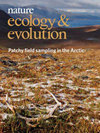Nature Ecology & Evolution
Nature Ecology & Evolution
英文簡(jiǎn)介The most striking feature of Life on Earth is its diversity, and the fields of ecology and evolution are central to understanding how biodiversity arose, how it is maintained, what are its consequences, and how we should conserve it. Evolution is the unifying concept than runs through all the life sciences, from the origin and diversification of life to understanding human behaviour to dealing with the challenges posed by disease. Ecology takes biology from the relative simplicity of individuals to explain the complexity of interactions between organisms and their environments. Its implications stretch beyond biology into environmental science and the grand challenges facing society.Nature Ecology & Evolution is interested in the full spectrum of ecological and evolutionary biology, encompassing approaches at the molecular, organismal, population, community and ecosystem levels, as well as relevant parts of the social sciences. Nature Ecology & Evolution provides a place where all researchers and policymakers interested in all aspects of life's diversity can come together to learn about the most accomplished and significant advances in the field and to discuss topical issues. An online-only monthly journal, our broad scope ensures that the research published reaches the widest possible audience of scientists.Like all Nature-branded journals, Nature Ecology & Evolution is characterized by a dedicated team of professional editors, a fair and rigorous peer-review process, high standards of copy-editing and production, swift publication and editorial independence.In addition to publishing original research, Nature Ecology & Evolution will publish Comment, Reviews, News and Views, Features and Correspondence from across the full range of disciplines concerned with ecology and evolution.
Nature Ecology & Evolution
中文簡(jiǎn)介地球上生命最顯著的特征是其多樣性,而生態(tài)學(xué)和進(jìn)化領(lǐng)域?qū)τ诶斫馍锒鄻有允侨绾萎a(chǎn)生、如何維持、其后果是什么以及我們應(yīng)該如何保護(hù)生物多樣性至關(guān)重要。進(jìn)化是貫穿所有生命科學(xué)的統(tǒng)一概念,從生命的起源和多樣化到理解人類行為,再到應(yīng)對(duì)疾病帶來(lái)的挑戰(zhàn)。生態(tài)學(xué)將生物學(xué)從個(gè)體的相對(duì)簡(jiǎn)單性中提取出來(lái),用來(lái)解釋有機(jī)體與其環(huán)境之間相互作用的復(fù)雜性。它的影響超越了生物學(xué),延伸到環(huán)境科學(xué)和社會(huì)面臨的巨大挑戰(zhàn)。《自然生態(tài)與進(jìn)化》對(duì)生態(tài)與進(jìn)化生物學(xué)的全貌感興趣,包括分子、生物、人口、社區(qū)和生態(tài)系統(tǒng)層面的研究方法,以及社會(huì)科學(xué)的相關(guān)部分。《自然生態(tài)與進(jìn)化》為所有對(duì)生命多樣性的各個(gè)方面感興趣的研究人員和決策者提供了一個(gè)場(chǎng)所,他們可以在這里一起學(xué)習(xí)該領(lǐng)域最成功和最重要的進(jìn)展,并討論當(dāng)前的熱點(diǎn)問(wèn)題。作為一份僅供在線閱讀的月刊,我們廣泛的范圍確保了所發(fā)表的研究成果能夠被最廣泛的科學(xué)家所接受。與所有自然品牌雜志一樣,《自然生態(tài)與進(jìn)化》擁有一支專業(yè)編輯團(tuán)隊(duì)、公平嚴(yán)謹(jǐn)?shù)耐性u(píng)審流程、高標(biāo)準(zhǔn)的編輯和制作、快速出版和編輯獨(dú)立性。除了發(fā)表原創(chuàng)研究,《自然生態(tài)與進(jìn)化》還將發(fā)表與生態(tài)與進(jìn)化相關(guān)的各個(gè)學(xué)科的評(píng)論、評(píng)論、新聞與觀點(diǎn)、特征和通信。
Nature Ecology & Evolution
中科院分區(qū)| 大類學(xué)科 | 分區(qū) | 小類學(xué)科 | 分區(qū) | Top期刊 | 綜述期刊 |
| 生物學(xué) | 1區(qū) | ECOLOGY 生態(tài)學(xué) EVOLUTIONARY BIOLOGY 進(jìn)化生物學(xué) | 1區(qū) 1區(qū) | 是 | 否 |
Nature Ecology & Evolution
JCR分區(qū)| JCR分區(qū)等級(jí) | JCR所屬學(xué)科 | 分區(qū) | 影響因子 |
| Q1 | ECOLOGY | Q1 | 19.1 |
| EVOLUTIONARY BIOLOGY | Q1 |
Nature Ecology & Evolution
中科院JCR分區(qū)歷年趨勢(shì)圖Nature Ecology & Evolution
影響因子精選同類領(lǐng)域期刊,熱門推薦輕松get~
-
- ABSTRACTS OF PAPERS OF THE AMERICAN CHEMICAL SOCIETY
- 期刊ISSN:0065-7727
- 大類研究方向:
- 影響因子:
- 數(shù)據(jù)庫(kù)類型:
- 咨詢投稿
-
- Abstract and Applied Analysis
- 期刊ISSN:1085-3375
- 大類研究方向:
- 影響因子:
- 數(shù)據(jù)庫(kù)類型:
- 咨詢投稿
-
- ABDOMINAL IMAGING
- 期刊ISSN:0942-8925
- 大類研究方向:
- 影響因子:
- 數(shù)據(jù)庫(kù)類型:
- 咨詢投稿
-
- ZEITSCHRIFT FUR ETHNOLOGIE
- 期刊ISSN:0044-2666
- 大類研究方向:
- 影響因子:0.100
- 數(shù)據(jù)庫(kù)類型:
- 咨詢投稿
精選常見問(wèn)題,答疑解惑輕松get~
- 三篇ssci論文怎么同時(shí)投出去
- 中文核心和sci哪個(gè)影響力更大
- 中科院一區(qū)和JCR一區(qū)期刊占比區(qū)別
- 發(fā)ssci如何快速找合適的期刊
- 資源保護(hù)方面論文投sci指導(dǎo)
- 外貿(mào)行業(yè)論文發(fā)ssci周期長(zhǎng)嗎
- 國(guó)外的sci投到錄用一般多久
- ssci期刊國(guó)內(nèi)認(rèn)可度
- 核能應(yīng)用論文翻譯英文發(fā)sci容易的方法
- 人口老齡化研究論文符合ssci領(lǐng)域嗎
- sci開源和不開源分別是什么意思?有什么影響?
- ssci發(fā)表是高水平學(xué)術(shù)論文嗎
- 生態(tài)修復(fù)主題英文論文會(huì)收錄哪些數(shù)據(jù)庫(kù)
- 哲學(xué)專業(yè)論文發(fā)英文期刊
- 中科院sci四個(gè)區(qū)的劃分
- ssci期刊和sci期刊的區(qū)別
- ESCI和SCIE要分清
- ssci送審論文多久出結(jié)果
- ssci論文二作有用嗎
- 水土保持類英文期刊好選嗎
- ssci期刊論文一定會(huì)檢索嗎

 投稿咨詢
投稿咨詢


















